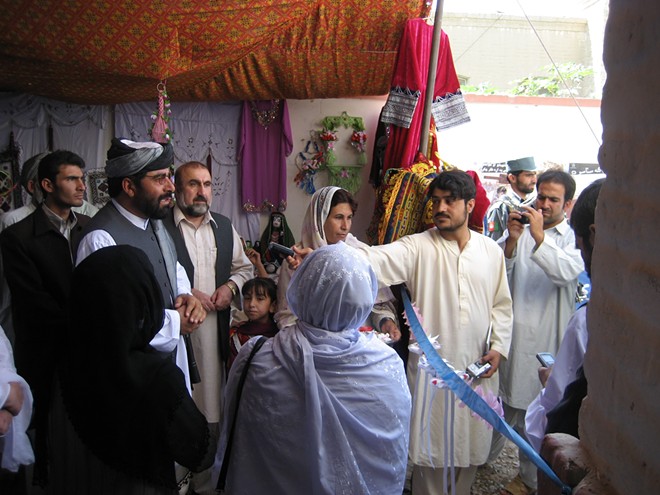
As this week's Inlander cover story shows, most of them didn't get out. They'd never had a chance. He rests his smartphone on the green picnic table as a video call blips to life. He's calling his sister-in-law's husband, one of the many Afghans who didn't make it out.
He's calling from the Afghan capitol, of Kabul, which he says has become a ghost town.
he original date was 9/11.
Back in April, President Joe Biden had proposed withdrawing all American troops from Afghanistan by Sept. 11, precisely two decades after the Twin Towers attack that ignited the American invasion. By July, however, under fierce criticism, he shifted the date to Aug. 31.
History rhymes on its own — you don’t have to force it. One collapse echoes another. First, it seems to happen in slow motion, and then it happens far faster than anyone expected. We are subjected to images of horror and desperation on a loop. Bodies plunging to their deaths, falling from a skyscraper, falling from a military cargo plane. Planes crash, causing unfathomable amounts of destruction. Planes take off, causing the same.
And in some way, Kazim has done something similar, compiling the names of thousands of Afghans, hoping there's still a chance to be re-united with their family members. A nonprofit called Allied Airlift 21 had compiled over 50,000 names on their "Afghan Ally Registry."
For some Afghans in America, there's still hope, amid the grief and outrage, that their loved ones will escape from the collapse.
Five days in a row, starting the day when the capital fell to the Taliban, Muhammad went to the airport in Kabul with his family. But the crowds were far too big and chaotic for a man with a wife and kids and an older mother beside him. He was watching those crowds as the mob crushed seven people to death.
"Do not go," he recalls his mother telling him. "Do not kill yourself and your family members in danger."
There were those willing to get people into the airport, but only for a price. They offered their services on a sliding scale, Muhammad says. $20,000 per person would get you on a flight. $5,000 or $10,000 per person will get you into the airport, but no further. If you didn't have any documents, like a visa or a U.S. passport, you'd be charged even more.
Though he and his wife both worked as judges, they couldn't afford it.
Heading for the border isn't an option either, Muhammad says.
Two weeks ago, Kazim told the Inlander his older sister had made it through the border at Pakistan. He truly believe she had — hoped she had. But a few days ago, he learned she hadn't. The crossing was too crowded, she was still stuck in Afghanistan, still looking for some way out.
"It is not possible for anyone to cross the border, especially for us who worked as a judge in Afghanistan," Muhammad says.
The best hope, he says, is for America to work out a deal with Uzbekistan, allowing those with verified documentation — proof of a Special Immigrant Visa process or similar evidence — to cross.
If that happens — if he has the right documents and the guarantee that if he makes it to the border he'll be safe — then Muhammad will have enough faith to leave.
"Then I can put my life in danger and my family at risk to accept all the consequences and try to cross the border," he says.
For now, he waits — scared, saddened and angry.
In the aftermath of the World Trade Center attacks, an entire industry of thinkpieces sprung up about how 9/11 had changed America forever. About how it killed irony or punctured our sense of safety or gave us a new perspective of the world.
But the truth is that, for many — if you didn't live in New York, if you weren't a military member or a Muslim, if you didn't have a complexion like Kazim's or a name like Muhammad's — then 9/11 didn't change America that profoundly.
Yes, meant a brief surge in national unity — the kind of unity that got us into one war, then another. It meant Freedom Fries and flag pins. It meant Toby Keith got more radio play and the Dixie Chicks got less. It meant we got an amazing issue of The Onion and an awful episode of the West Wing.
But that brief flash of national unity evaporated in moments, and we were back to our partisan sniping and our conspiracy theories and our political bombast, just as we had been in the Clinton era.
Yes, our airports got more miserable. We were forced to slip off our shoes and downsize our shampoos. But that's nothing compared to the truly seismic impact that 9/11 had on another country: Afghanistan. We started bombing in less than a month. Ground forces landed a week later.
And from one vantage point, the invasion brought Afghans the freedom we thought it did.
"After the United States invaded Afghanistan, we noticed an absolutely positive change. We noticed human rights being respected by people, "Muhammad says. "We noticed all the businesses that were opened. We were hoping for a bright future in Afghanistan."
"Unfortunately, after President Trump made the decision that the United States has to evacuate Afghanistan, everything will change," he says.
"Once you make a deal and you try to evacuate Afghanistan, then you have to leave
everything behind," Muhammad says.
"If you want to save a building, you have to start from scratch," Kazim says. "You cannot just fix the roof every year."
Without cutting off the support for terrorists and the Taliban coming from Iran and Pakistan, he says, the American's efforts were doomed.
"I don't even know the theory of why even America got involved in Afghanistan. Because of 9/11? Okay, makes sense," Kazim says. "You went there, got Osama Bin Laden, you killed him."
But that was a decade ago, he says. If the mission was just a military one, he argues, you could have been in and out on five.
"Why did you spend 20 years over there?" Kazim says. "For 20 years in Afghanistan, who is responsible for all those lives?"
Of all the cliches to come out of the World Trade Center attacks, "Never Forget," always felt like the most absurd. As if the attack that blotted out the tallest pieces from the skyline of America's biggest city would just slip our mind. As if 9/11 wouldn't become etched into the calendar, one more date that still lives in infamy. Of course, Americans won't forget 9/11, any more than we'll forget we landed on the moon or that JFK got shot in Dallas or that Lincoln ended slavery.
The question isn't about we'll ever forget 9/11 but will we truly remember what happened in Afghanistan.
On a recent Wednesday afternoon, Kazim joins nearly a hundred local Afghans and their supporters gathered at Riverfront Park. They waved large Afghan flags and banners. They carried signs with slogans like "Afghan Lives Matter" and "Afghanistan is Bleeding" and "UN! Don't recognize Taliban," A little girl holds up a Reuters photo of the Taliban at a press conference with a red X through it. They carry signs condemning Pakistan and cheering on the fighters still battling the Taliban in Panjshir Valley.
And, in a twist on the slogan that Americans have seen from countless videos of the Middle East since 9/11, the crowds begin to chant: "Death to Taliban! Death to terrorists!"
The fighting and the deaths in Afghanistan will still rage with the United States gone, whether between the Taliban and the Northern Alliance or the Islamic State’s splinter group ISIS-K or the Al-Qaeda affiliated Haqqani Network.
Yet America only truly pays attention to a war when we get to play a main character. This week, you could see the Afghanistan discussion already start to dwindle away. The chattering class finds other things to chatter about — whether it's the Texas abortion law, Biden's vaccine mandate, or Olivia Munn's Mulaney baby.
Kazim suspects that America may forget Afghanistan, but only for a time. What has happened before in Afghanistan, Kazim predicts, is “going to happen again and again and again.”
I ask the same question of Muhammad: Was he worried that the United States would forget Afghanistan?
Kazim translates, but Muhammad doesn't answer. The cell phone has run out of its battery, cutting off our connection to Kabul. For a brief moment, we sit there at the picnic table, in the darkness and the silence.























